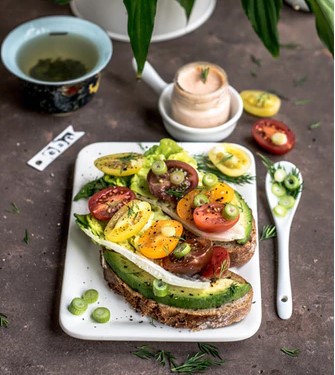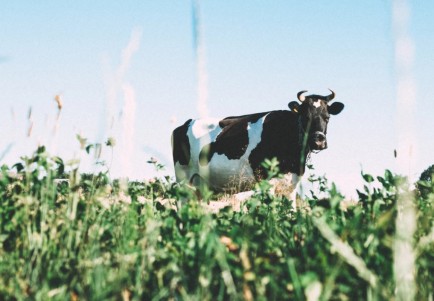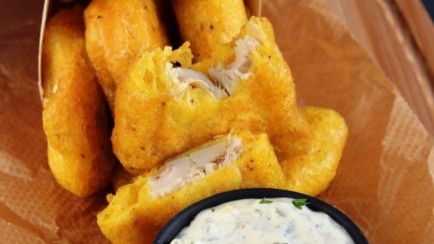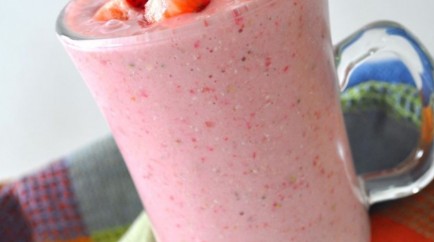When I ordered shrimp rolls at a tapas bar 12 weeks into my pregnancy, one of my friends reacted as if I’d ordered a double martini. “You can’t have shrimp when you’re pregnant!” she insisted. When I asked her why not, all she could offer was, “Well, I’m not sure, but I know you can’t.” Turns out, she was mistaken (phew! I ordered the shrimp anyway), a common phenomenon when it comes to prenatal nutrition.
Yes, certain foods and eating patterns can compromise a baby’s development in utero, and every mom-to-be should know about them. But it’s equally important to focus on the nutrient-rich foods and healthy habits that will keep you and your baby thriving for the whole nine months. Here, in a nutshell, is the lowdown on prenatal nutrition.
(the 5 do’s)
- DO LOAD UP ON THE “BIG 5” NUTRIENTS: FOLATE, CALCIUM, IRON, ZINC AND FIBER
Before conception and in the first six weeks of pregnancy, no nutrient is more vital than folate (the synthetic form is folic acid). This B vitamin can reduce the risk of neural-tube defects, such as spina bifida, by a whopping 70 percent.
You can get your daily minimum of 400 micrograms (600 micrograms is recommended in the first trimester) from beans and legumes, citrus fruits and juices, whole grains, dark green leafy vegetables, poultry, pork, fish and shellfish, but folate from foods is not as well absorbed as folic acid, so pop a prenatal vitamin or folic acid supplement for insurance.
Your daily dose of calcium—1,200 milligrams from low-fat dairy products, dark green vegetables and fortified orange juice and soy products—plays a key role during the second and third trimesters, when your baby’s bone and tooth development reaches its peak. Because the fetus leaches calcium from your body, getting enough of this mineral can protect your own bones, too. Iron, important for supporting your 50 percent increase in blood volume, is crucial in the third trimester. Aim for 30 milligrams per day.
“Iron is difficult to get from the diet, so take an iron supplement or prenatal vitamin with iron,” advises Hope Ricciotti, M.D., an associate professor of OB-GYN at Harvard Medical School and co-author of I’m Pregnant! Now What Do I Eat? (DK Publishing). To boost iron absorption, combine iron-rich foods with vitamin C sources.
Your zinc requirement increases by 50 percent to 15 milligrams per day when you’re pregnant. Zinc deficiencies have been linked with birth defects, restricted fetal growth and premature delivery, Ricciotti says. Although nuts, whole grains and legumes are good sources, the mineral is best absorbed from meat and seafood.
Fiber (found in fruits, vegetables and whole grains) is particularly essential for your own health. It helps prevent reduce constipation, a common pregnancy complaint that can lead to hemorrhoids, and it makes you feel fuller longer; aim for 25 milligrams to 35 milligrams a day.
- DO EAT A RAINBOW OF FOODS
Not only does a varied diet provide you and your baby with all the important nutrients, but an eclectic mix also introduces your little munchkin to new tastes via the amniotic fluid. Of course, if bananas and saltines are the only foods you can stomach in the first trimester, don’t stress about it. “But as soon as you start feeling better, aim for more variety,” says Orlando, Fla., nutritionist Tara Gidus, M.S., R.D. Deep-hued fruits and vegetables, such as blueberries, carrots and spinach, tend to be richest in antioxidants.
- DO LIMIT YOUR EXPOSURE TO PESTICIDES BY CHOOSING ORGANIC AND LOCALLY GROWN FOODS WHEN POSSIBLE
“The developing immune system is so much more sensitive than the adult’s,” says Rodney Dietert, Ph.D., professor of immunotoxicology at Cornell University’s College of Veterinary Medicine, whose research has linked prenatal pesticide exposure to later- in-life immune dysfunctions.
Other research has connected pesticides in the water supply to premature births and possibly birth defects. “We have a lot of evidence now that nitrates [chemicals used in fertilizer] and pesticides have the ability in very small doses to interact with the hor- monal milieu of the pregnancy,” says Paul Winchester, M.D., a clinical professor of pediatrics at the Indiana University School of Medicine. Washing your produce helps, Winchester says, but may not be enough. The types of produce harboring the highest pesticide concentrations tend to be fruits and vegetables with thin skins, such as peaches, apples, bell peppers and strawberries. (For a list of the worst offenders, go to fitpregnancy.com/thedirtydozen.) Also know that foods imported from other countries, such as Mexico or Chile, may contain pesticides that are prohibited in the U.S.
- DO GET YOUR OMEGA-3 FATTY ACIDS
A diet rich in omega-3s can boost your baby’s brain and neurological development before birth, likely leading to better vision, memory and language comprehension in early childhood. It also may reduce your risk of post- partum depression. Flaxseed oil, walnuts and omega-3-fortified eggs are good sources of ALA, one of the three omega-3 fats, but fatty fish are the only reliable sources of the two more important omega-3s, EPA and DHA, according to Ricciotti. The National Institutes of Health recommend that pregnant and nursing women get at least 300 milligrams of DHA in their daily diet.
The trick is to choose fish that are high in omega-3s but low in mercury, which can harm a fetus’s nervous system. Varieties to avoid include swordfish, shark, king mackerel, tilefish and, some experts now say, tuna, though canned light tuna is safer than albacore. Top picks include wild Alaskan salmon (fresh, frozen or canned), Atlantic mackerel, herring, sardines and anchovies. Fish oil supplements are also safe. (For the best seafood choices during pregnancy, go to fitpregnancy.com/safeseafood.)
- DO CHOOSE “DOUBLE DUTY” FOODS
“Nutrient-dense foods, such as yogurt, peanut butter, chicken, beef, eggs and dairy products, are those that are higher in protein, calcium and iron, all nutrients your baby needs to grow and develop properly,” says Rose Ann Hudson, R.D., L.D., co-author of Eating for Pregnancy: An Essential Guide to Nutrition With Recipes for the Whole Family (Marlowe & Company). Some other nutrient-dense foods: Lean pork, like beef, contains protein, along with B vitamins, iron and zinc; orange juice offers folate plus vitamin C, which helps you absorb iron from foods such as fiber-rich black beans and spinach; whole grains are filled with fiber, B vitamins, magnesium and zinc.
Read on for “the 5 don’ts”
(the 5 don’ts)
- DON’T “EAT FOR TWO.”
Half of all women gain too much weight during pregnancy, according to recent studies; that’s up from 37 percent in 1993. Research suggests that when moms-to-be gain excess weight, “the babies have a higher risk of obesity later in life,” Ricciotti says. Plus, the mothers tend to retain extra poundage after giving birth.
It’s crucial to base your pregnancy weight-gain goal on your height and prepregnancy weight. (To find out what’s appropriate for you, go to fitpregnancy.com/weightgain.) If you’re expecting twins and your prepregnancy body-mass index (BMI) was normal (18.5 to 24.9), experts now recommend gaining 37 to 54 pounds: 20 to 30 pounds by 20 weeks; 30 to 46 pounds by 28 weeks; and the rest in the last trimester.
If you’re carrying a single baby, you need approximately 340 extra calories per day in the second trimester and 450 extra in the third trimester. Doctors disagree on whether you need more calories in the first trimester—if you’re overweight, you likely don’t. But rather than count calories, simply eat until you feel satisfied, and not more. If you have a problem with portion control, seek the guidance of a registered dietitian.
- DON’T OVERDOSE ON REFINED CARBS
White bread, white rice, sweets and sodas rush into your bloodstream, spiking your blood glucose levels. These spikes may result in fatter newborns, who are at greater risk of being overweight as they grow up. “If you consume the same number of calories but just change what you eat, your baby may have less body fat at birth and a lower risk of future obesity,” Ricciotti says. Limit the white stuff and choose unrefined grains such as oatmeal, brown rice, quinoa and whole-wheat tortillas and bread.
- DON’T OVERLOOK FOOD SAFETY
To protect yourself and your baby from harmful bacteria such as E. coli, Salmonella and Listeria, “don’t eat raw or undercooked meat, poultry, seafood or eggs, and don’t eat leftover food that has been sitting out for more than two hours,” says Gidus. Also, stick a thermometer in your refrigerator to make sure the temperature is below 40 degrees, cold enough to stop bacteria from growing. Heat deli meats until steaming hot. With Brie, blue cheese and other soft cheeses, check the label to make sure they are made with pasteurized milk; unpasteurized soft cheese can harbor Listeria, which can lead to premature delivery, miscarriage or stillbirth. If there’s no label, don’t take the chance. Stay away from sushi made with raw fish, but you’re welcome to enjoy California rolls containing imitation crabmeat or sushi made with cooked eel.
- DON’T GO MORE THAN TWO TO THREE HOURS WITHOUT EATING
Grazing not only pumps a steady stream of nutrients to your baby, it also keeps your blood sugar levels steady so you don’t “crash” or become lightheaded. “If you don’t fill the tank frequently, you can bottom out,” says Ricciotti. Smaller meals also minimize heartburn, a common and painful problem as pregnancy progresses and your stomach gets squeezed.
- DON’T FORGET TO DRINK AT LEAST 12 8-OUNCE GLASSES OF FLUID A DAY
“It’s hard to stay hydrated when you’re pregnant because a lot of the fluid you drink leaks from your blood vessels into your tissues,” Ricciotti explains. Yet hydration is essential for preventing preterm labor; when you’re short on fluids, the body makes a hormone that simulates contractions. Staying hydrated also helps prevent headaches, kidney stones, dizziness and common pregnancy complaints such as constipation and hemorrhoids. You know you’re well hydrated when your urine is light yellow to clear.
Original article: https://www.fitpregnancy.com/nutrition/prenatal-nutrition/10-safe-and-healthy-foods-pregnancy



























Comments